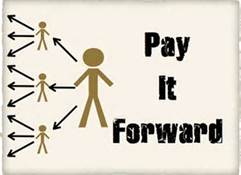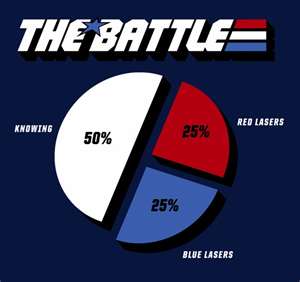 I wrote a series of posts in March of 2012 about stupid platitudes and one of them passingly referenced prayer. The post wasn’t really about prayer at all but about the stupid platitude. Nevertheless I did suggest that prayer was rather silly. I went further into that concept in another post much later.
I wrote a series of posts in March of 2012 about stupid platitudes and one of them passingly referenced prayer. The post wasn’t really about prayer at all but about the stupid platitude. Nevertheless I did suggest that prayer was rather silly. I went further into that concept in another post much later.
In any case, a reader stumbled upon the platitude post and began a dialog with me expounding on why I was wrong about prayer. I replied and so on. Eventually the person began to wander far afield from the original premise and posted the following:
… if you personally know that there is no God, what do you believe about things like little girls in the Congo being raped to death? Is that bad? If so, why? Who decided it was bad? I believe rape and murder are EVIL and horrific, and my worldview has an explanation for the concept of evil. A gap in the godless explanation of the universe is that there I have found no convincing evidence as to why we should view anything as bad or good.
I read this to mean that in a world without god there is no differentiating between raping and murdering little girls and serving them tea and cookies. I was physically upset by this argument. My stomach churned, I felt like vomiting. That the lack of belief in god meant lack of belief in evil, or good for that matter. Not even just the belief of evil but that evil and good do not exist without god.
I suppose one could argue that without god the world would not exist and good and evil are part of the world but I don’t think that is what is meant here. I think what is meant here is that if the world exists, but wasn’t created and governed by god, that there is no difference between good and evil.
I was so horrified, so outraged, that I decided to wait a few days before posting anything.
“Who decided it was bad?” How about every single human culture that has ever existed, regardless of their religious view. Long before you, long before Jesus, long before the Jews, people knew it was bad.
Rape, by the way, is mentioned in a number of place in the bible. My favorite is Deuteronomy 22:28-29 in which the rapists is punished by having to give the father of the rape victim fifty bucks and has to marry the woman he just raped.
After I settled down I began to wonder if the person commenting actually had a christian view of evil or if they were misinterpreting the concept. I did some research.
I went around and read articles about evil and articles about divine law. From everything that I can find, the christian view of evil is not that god defines it. There are broad parameters of wrong but by in large god decided to allow evil to exist because otherwise people would not know good. Nowhere could I find a clear definition. In a number of places christians try to explain why in the old testament god orders his people to murder, to rape, to enslave their enemies but in no place is evil defined. Rape is largely explained as wrong because it is fornication, sex outside of wedlock, not because you are forcing yourself on a woman who doesn’t want to have sex with you.
There are many restrictions in the bible, in particular the Book of Leviticus; adultery, eating four-legged insects (used to be birds but got changed on reinterpretation), offering grain without yeast, eating blood or fat, giving birth to a boy, skin disease, moldy clothes, well I could go on and on. The point is evil is not defined. Behavior, certainly. Evil simply exists.
So, in the end I can’t get too upset. Either the person making the comment didn’t explain what she meant very well or she is confused as to the biblical interpretation of evil.
The concept is interesting though because I’m often asked by religious people when they find out I’m an atheist, “Why are you good? What keeps you from doing bad things?”
The answer of course is everything Rand. I do good because it’s in my best interest to do good. If I raped little girls I’d be thrown into prison, murdered by outraged parents, beaten to a pulp by brothers and friends.
Even if I was a soldier, invading an enemy land, and could rape a girl without consequence I would not do it because I respect her as a human being, I respect myself as a human being. Because I know if someone raped one of my sisters I’d want to kill that person. As would anyone, regardless of their religious beliefs, since the beginning of humanity.
Why do I think rape is evil? Because I decided it is.
Tom Liberman
Sword and Sorcery fantasy with a Libertarian Twist
Current Release: The Sword of Water ($2.99 is a bargain for 300+ pages of great reading)
Next Release: The Spear of the Hunt
 That’s the question that I saw posted on Facebook and the vehemence of my reaction surprised me. Fuck no.
That’s the question that I saw posted on Facebook and the vehemence of my reaction surprised me. Fuck no.

 While my legion of loyal followers knows me as a prolific blogger and author of stupendous Sword and Sorcery novels I’m not ashamed to admit that neither one of those endeavors pays the bills. I’d like for my novels to become best-sellers and box-office blockbusters but, as of this moment, what allows me to live comfortably is my job at
While my legion of loyal followers knows me as a prolific blogger and author of stupendous Sword and Sorcery novels I’m not ashamed to admit that neither one of those endeavors pays the bills. I’d like for my novels to become best-sellers and box-office blockbusters but, as of this moment, what allows me to live comfortably is my job at  I’ve noticed that the concept
I’ve noticed that the concept 














